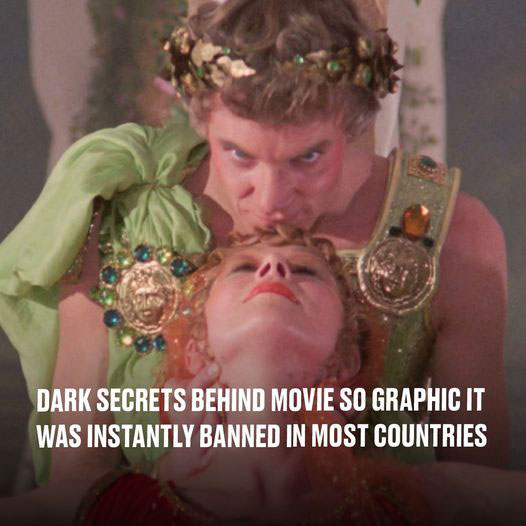In 1979, a film emerged from the depths of cinematic history, shocking audiences and critics alike with its graphic content. That film was Caligula, a historical drama that dared to depict the life of the infamous Roman emperor in such an explicit manner that it became one of the most controversial films ever made. Star Helen Mirren famously described it as “an irresistible mix of art and genitals.” A statement that barely scratches the surface of the film’s notoriety.
The Immediate Backlash on Caligula: Censorship and Confiscation

Upon its release, Caligula faced swift and severe backlash. In Italy, authorities confiscated the film, labeling it “flagrantly obscene.” The U.S. followed suit, with customs officials seizing the footage upon its arrival, though they stopped short of officially declaring it obscene. The situation was no different in the UK, where the film’s reels were heavily edited to remove footage deemed too extreme for public viewing.
The editing process in the UK was a lengthy one. It took six months to cut a staggering eight minutes of footage. These scenes included graphic depictions of castration, disembowelment, and assault. Elements that pushed the boundaries of what was considered acceptable in cinema at the time. Even after this extensive censorship, another three minutes of the film were cut before the movie could be released.
A Box Office Bomb with a Lasting Legacy

Despite the extensive cuts and censorship, Caligula was universally panned by critics. Various versions of the film were created, each with differing levels of explicit content. BUT none could escape the shadow of its controversial nature. In 1985, the film made history as the first to feature unsimulated sex scenes on French television, further cementing its status as a cultural lightning rod.
Banned so Many Times

The movie was banned in numerous countries, with some refusing to lift the ban even after multiple edits. It wasn’t just the graphic content that made Caligula notorious; it was also the troubled production that led to its downfall. The film starred big names like Malcolm McDowell, Helen Mirren, and Peter O’Toole, but even their performances couldn’t save the movie from its fate.
The Turbulent Production and Disownment

The original screenplay for Caligula was penned by renowned writer Gore Vidal. He envisioned a historical epic that explored the excesses and debauchery of ancient Rome. However, as the production progressed, Vidal grew increasingly disillusioned with the direction the film was taking. Rewrites by others added more sex and violence, straying far from his original vision. Vidal eventually asked for his name to be removed from the project, a move that signaled the beginning of the film’s descent into chaos.
One of the movie’s producers, Bob Guccione, was the founder of the adult magazine Penthouse. Guccione took it upon himself to insert hardcore sex scenes into the film, using Penthouse Pets as extras. British model Jane Hargrave, who was among those cast in the film, later claimed that Guccione showed the women bestiality videos and encouraged them to perform real sex acts on camera. These actions led director Tinto Brass to disown the film. Leaving Caligula without the support of both its writer and director.
The Ultimate Cut: A Reassessment?

Earlier this month, Caligula: The Ultimate Cut was released in select cinemas, offering a somewhat revised version of the original film. This latest cut received better reviews than its initial release. But it still couldn’t shake the stigma that has clung to the movie for decades. With 90 hours of footage to work with, the creators of this cut tried to piece together a version of Caligula that might redeem it in the eyes of modern audiences.
Why Caligula Endures

The enduring fascination with Caligula lies in its audacity. It pushed the boundaries of cinema in ways that few films have dared to since. As discussed in a recent analysis by Collider, the film’s legacy is not just about its explicit content but also about the chaotic production and the conflicting visions of its creators. The article suggests that Caligula is a movie “built on a bad reputation,” where the shock value overshadowed any artistic merit the film might have had.
While the movie may have been a box office bomb, its impact on cinema is undeniable

It remains a subject of debate and analysis, a film that challenges our understanding of what is acceptable on screen. Whether seen as a cautionary tale or a misunderstood work of art, Caligula continues to provoke strong reactions,. Proving that even the most scandalous films can leave a lasting mark on cultural history.
